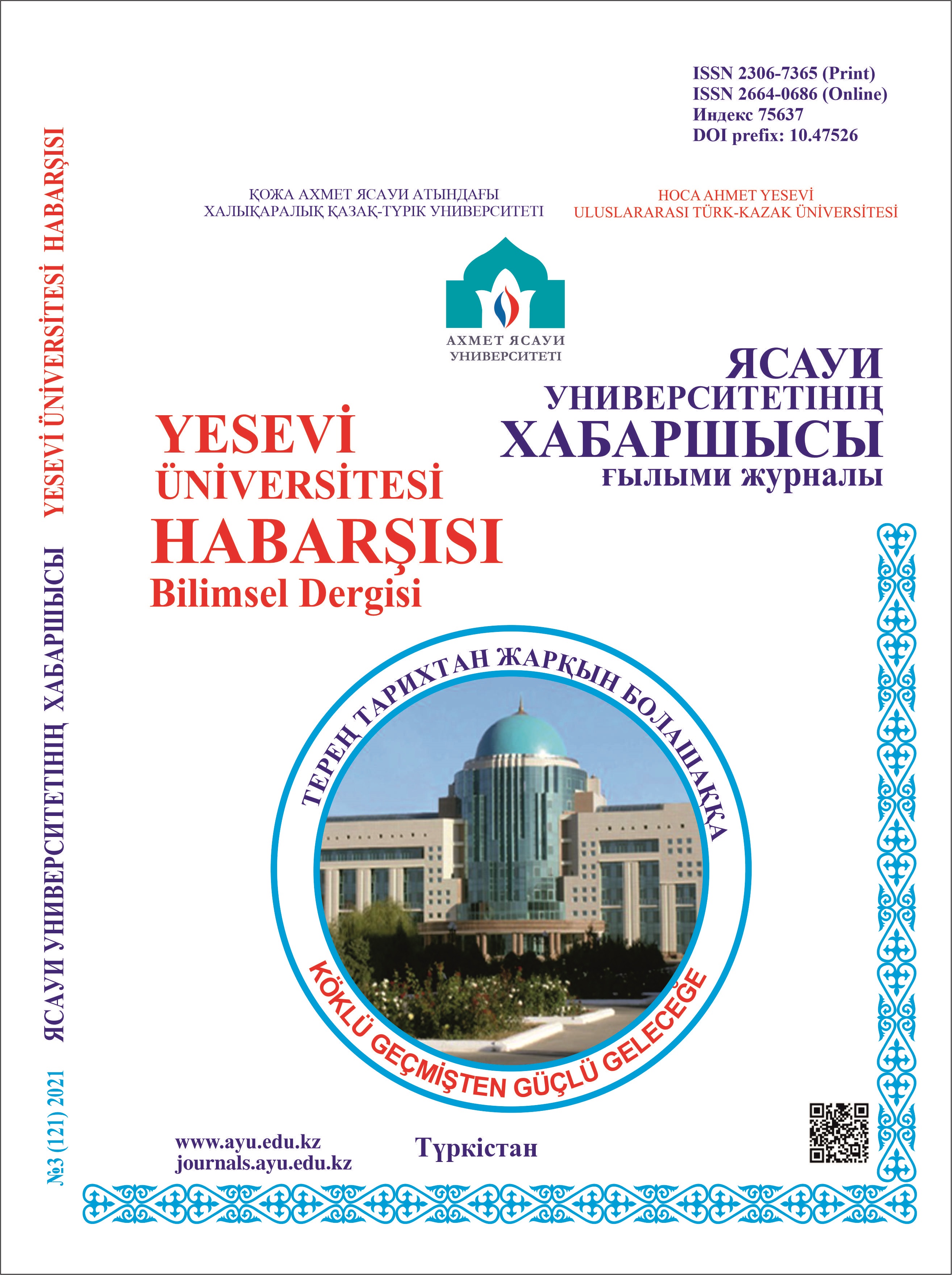Non-formal Education on the Coursera Platform: a Regional University Experience
252 129
Keywords:
non-formal education, Coursera, personal development, professional development, language level, university students.Abstract
This article provides a discussion of the usage of massive open online courses on the Coursera platform as a resource for non-formal education in Kazakhstan. The authors of this research define non-formal education as one of the strategies for students’ personal and professional development. The article aims to evaluate the efficacy of massive open online courses in improving the language level of language majors studying. The usage of a variety of methods including theoretical and comparative analysis, pedagogical experiment, testing and content analysis are described to illustrate the findings collected during the study process. The methods of mathematical statistics, such as the non-parametric statistical criterion Mann-Whitney U-test and SPSS Statistics 27.0 program were utilized in this research. 68 3rd year students of the educational program “Foreign Language: Two Foreign Languages” of Pavlodar Pedagogical University named after Alkey Margulan took part in the pedagogical experiment. Data were collected from 4 massive open online courses on the Coursera platform: “Work Smarter, Not Harder: Time Management for Personal & Professional Productivity”, “Programming for Everybody (Getting Started with Python)”, “Project Management: The Basics for Success” and “Leading teams: Building Effective Team Cultures”. The empirical study and the conclusions demonstrated that massive open online courses on the Coursera platform increase the level of language proficiency by 23.6%, allowing students to realize their goals outside the university, and also develop their metacognitive abilities.
References
Национальный план развития Республики Казахстан до 2025 года. [Электронный ресурс]. URL: https://adilet.zan.kz/rus/docs/U1800000636 (дата обращения 16.01.2024)
Концепция развития высшего образования и науки в Республике Казахстан на 2023-2029 годы. [Электронный ресурс]. URL: https://adilet.zan.kz/rus/docs/P2300000248 (дата обращения 25.01.2024)
Государственный общеобязательный стандарт высшего и послевузовского образования. [Электронный ресурс]. URL: https://adilet.zan.kz/rus/docs/V2200028916 (дата обращения 02.02.2024)
Иванищева Н.А. Неформальное образование студентов педагогических университетов // Непрерывное образование: XXI век. – 2022. – №4(40). – С. 1–10. https://doi.org/10.15393/j5.art.2022.8008
Якушина М.С. Неформальные образовательные практики в пространстве непрерывного образования педагогов // Человек и образование. – 2022. – №1(62). – С. 9–15.
Holland A.A. Effective principles of informal online learning design: A theory-building metasynthesis of qualitative research // Computer & Education. – 2019. – №128. – P. 214–226. https://doi.org/10.1016/j.compedu.2018.09.026
Jansen R.S., Leeuwen A., Janssen J., Conijn R., Kester L. Supporting leaners’ self-regulated leaning in Massive Open Online Courses // Computer & Education. – 2020. – №146. – P. 214–226. https://doi.org/10.1016/j.compedu.2019.103771
Lee D., Lee S.L., Watson W.R. Systematic literature review on self-regulated learning in massive open online courses // Australasian Journal of Educational Technology. – 2019. – №1 (35). – P. 28–41. https://doi.org/10.14742/ajet.3749
Maldonado-Mahauad J., Perez-Sanagustin M., Kizilcec R.F., Morales N., Munoz-Gama J. Mining theory-based patterns from big data: Identifying self-regulated learning strategies in Massive Open Online Courses // Computers in Human Behavior. – 2018. – №80. – P. 179–196. https://doi.org/10.1016/j.chb.2017.11.011
Alimova Sh.Zh., Nygmetova B.D., Kairbayeva A.K. Massive open online course development: experience of a regional university // Bulletin of Ablai khan KazUIRand WL. Series “Pedagogical Sciences”. – 2022. – №4(67). – P. 57–68. https://doi.org/10.48371/PEDS.2022.67.4.005
Amado C., Dorotea N., Pedro A., Piedade J. MOOCs Design: A Conceptual Framework for Continuous Teacher Training in Portugal // Education Sciences. – 2022. – №12(308). – P. 1–21 https://doi.org/10.3390/educsci12050308
Mahajan R., Gupta P., Singh T. Massive Open Online Courses: Concept and Implications // Indian Pediatrics. – 2019. – №56. – P. 489–495. https://doi.org/10.1007/s13312-019-1575-6
Saegusa T. Mann-Whitney test for two-phase stratified sampling // Stat. – 2020. – №1(10). – P. 1–12. https://doi.org/10.1002/sta4.321
REFERENCES
Nacionalnyi plan razvitia Respubliki Kazahstan do 2025 goda [National Development Plan of the Republic of Kazakhstan until 2025]. [Electronic resource]. URL: https://adilet.zan.kz/rus/docs/U1800000636 (date of access 16.01.2024) [in Russian]
Koncepcija razvitia vysshego obrazovania i nauki v Respublike Kazahstan na 2023–2029 gody [Concept for the development of higher education and science in the Republic of Kazakhstan for 2023-2029]. [Electronic resource]. URL: https://adilet.zan.kz/rus/docs/P2300000248 (date of access 25.01.2024) [in Russian]
Gosudarstvennyi obsheobiazatelnyi standart vysshego i poslevuzovskogo obrazovania [State compulsory standard of higher and postgraduate education]. [Electronic resource]. URL: https://adilet.zan.kz/rus/docs/V2200028916 (date of access 02.02.2024) [in Russian]
Ivanisheva N.A. Neformalnoe obrazovanie studentov pedagogicheskih universitetov [Non-formal education of students of pedagogical universities] // Nepreryvnoe obrazovanie: XXI vek. – 2022. – №4(40). – S. 1–10. https://doi.org/10.15393/j5.art.2022.8008 [in Russian]
Iakushina M.S. Neformalnye obrazovatelnye praktiki v prostranstve nepreryvnogo obrazovania pedagogov [Non-formal educational practices in the space of continuing education of teachers] // Chelovek i obrazovanie. – 2022. – №1(62). – S. 9-15. [in Russian]
Holland A.A. Effective principles of informal online learning design: A theory-building metasynthesis of qualitative research // Computer & Education. – 2019. – №128. – P. 214–226. https://doi.org/10.1016/j.compedu.2018.09.026
Jansen R.S., Leeuwen A., Janssen J., Conijn R., Kester L. Supporting leaners’ self-regulated leaning in Massive Open Online Courses // Computer & Education. – 2020. – №146. – P. 214–226. https://doi.org/10.1016/j.compedu.2019.103771
Lee D., Lee S.L., Watson W.R. Systematic literature review on self-regulated learning in massive open online courses // Australasian Journal of Educational Technology. – 2019. – №1 (35). – P. 28–41. https://doi.org/10.14742/ajet.3749
Maldonado-Mahauad J., Perez-Sanagustin M., Kizilcec R.F., Morales N., Munoz-Gama J. Mining theory-based patterns from big data: Identifying self-regulated learning strategies in Massive Open Online Courses // Computers in Human Behavior. – 2018. – №80. – P. 179–196. https://doi.org/10.1016/j.chb.2017.11.011
Alimova Sh.Zh., Nygmetova B.D., Kairbayeva A.K. Massive open online course development: experience of a regional university // Bulletin of Ablai khan KazUIR and WL. Series “Pedagogical Sciences”. – 2022. – №4(67). – P. 57–68. https://doi.org/10.48371/PEDS.2022.67.4.005
Amado C., Dorotea N., Pedro A., Piedade J. MOOCs Design: A Conceptual Framework for Continuous Teacher Training in Portugal // Education Sciences. – 2022. – №5(12). – P. 1–21. https://doi.org/10.3390/educsci12050308
Mahajan R., Gupta P., Singh T. Massive Open Online Courses: Concept and Implications // Indian Pediatrics. – 2019. – №56. – P. 489-495. https://doi.org/10.1007/s13312-019-1575-6
Saegusa T. Mann-Whitney test for two-phase stratified sampling // Stat. – 2021. – №1(10). – P. 1–12. https://doi.org/10.1002/sta4.321

